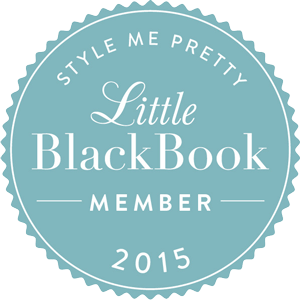
Bridal Guide Magazine
January 2016
January 2016
Wedding Vendors: When To Say Yes – Or No
First, you’ve got to rely on your instincts — but also consider these tips from seasoned wedding professionals so you can better spot good traits and avoid red flags.

Photo Credit: Open Aperature Photography
Good Signs:
If you’re seeing positives from this list, you’re likely on the right track.
You get along. When you meet would-be vendors, consider more than their samples (though those should be standout). “Number one, you should feel comfortable with the person you’re dealing with,” says Nick Brune, co-owner and executive chef of Eco Caters, an organic and locally-sourced catering company based in Southern California.
Communication is easy. You need to be able to talk to each other and have your questions answered. “If your planner doesn’t communicate well, entire items could be missed from your event,” says Brune. You want a vendor who communicates well with you and with other vendors.
You can see a complete portfolio. “It’s important to see an online portfolio so you can see the quality of their vision,” says Erwin Gomez, celebrity makeup artist and owner of KARMA by Erwin Gomez, a beauty lounge in Washington, DC. Pictures should look professional and not overly edited, and photographers (in particular) should show an event from start to finish — not just snaps here and there.
It’s easy to book a trial or see samples. You should try out your hairstyle or makeup before your wedding to make sure you like it, and you must be able to see (and taste!) what you’re getting when it comes to catering. But while portfolios are important (see above), they can include Photoshopping, Gomez notes. “That’s why a [makeup] trial is so important,” he adds. “There’s nothing like seeing it live, on your own.”
You like the test run. If you like what you see (or eat) — and don’t have to make too many changes or overly compromise on your vision — that’s a good sign of things to come. “The mirror reflects on you, and the mirror doesn’t lie,” says Gomez.
You find good online reviews. References are key, but don’t rely on those offered by a vendor (though he or she should have them available.) “Yelp is huge,” says Gomez, also advising you to see what other clients say on social media sites. Positive Google reviews also are great.
Staff at your venue are on board. “One of the best tips I can give is to ask your venue about any wedding vendors you are considering using,” says Sheila Weiner, president and founder of The Event Group, which specializes in weddings and parties in the greater Pittsburgh area. “They will usually have the best insight on whether that individual is a good fit for your big day.”
Things are put together. When you meet your vendor for the first, second, or third time, if he or she is prepared with things you’ve asked for, that’s a good sign. “Organization is everything,” says Gomez.
Responses are quick. If you email or call, follow-up is key. You shouldn’t necessarily expect a reply after business hours, but timely responses are important.
The website is attractive and current. “A website should really show what a company is and who they are,” says Brune. In the case of a catering company, he says, the food should look good in photos, and there should be seasonal options.
Red Flags:
If a vendor has traits from this list, you may want to say “I don’t” when it comes to working together.
There’s no insurance — or not enough. You hope nothing goes wrong on your big day, but if it does, a vendor’s insurance can help protect all parties. “Wedding vendors should be insured for a minimum of 1 million dollars,” says Weiner. “Be sure to ask about their insurance coverage during your meeting.”
The vendor lacks a license. Laws can vary by state, but lack of a license can be a big red flag. In general, all caterers should have some type of license or permit from a city or county health authority. “In California, you have to be in a licensed kitchen,” adds Brune. So ask what licenses are typically required, and make sure your vendor has them.
There is no contract. This document is a must. It should fully explain things like how deposits and payments work, what the cancellation policy is, and what exactly you’re responsible for versus what the vendor will provide. “If they don’t have a contract, that’s a red flag,” Gomez says.
Your styles are super different. You don’t need to be a carbon copy of your service provider, but your styles should blend. “If you are a bohemian style bride, chances are you are not going to like a more traditional wedding planner’s photo gallery,” notes Weiner.
Pushiness prevails. If a vendor doesn’t respect your ideas or your budget or makes you feel uncomfortable, be concerned. “If you walk away from a meeting not liking the person, you are probably not going to like their work or their presence on the big day,” Weiner says.
Your wedding planner has no staff. Some really great vendors start off working alone — and some (like your officiant) always will. But solo operations can be problematic for wedding planners. “If it is a one-man show, but the planner says they take more than one event a day, chances are you are not going to be getting the attention and service that you will be paying for,” says Weiner. “There should always be two planners involved, not only on the day of, but during the entire planning process. If something were to come up with one of the planners, there is always a backup person equipped to take the lead.”
The vendor is overbooked. “Ask how many events they usually take on any given day,” says Weiner. And when you’re dealing with a makeup artist or hair stylist, for instance, ask how long your appointment will be to make sure you’ll have sufficient time. (You should have an idea of how much time you need from your trial.) If a vendor is late or ducks out early, you won’t be happy.
You’ve never seen the person in person. If you’re planning a local wedding, get together. “Meeting in person is key to see whether or not your personalities blend well,” says Weiner. “Most local vendors prefer to meet their clients in person, so it is definitely a red flag when they do not want to meet face-to-face.” And if you are planning a destination wedding, try to have productive, detailed conversations.
The vendor doesn’t understand your vision. “I always ask the guest what their vision is. It’s very important that they have a vision and some idea of what they’re looking for,” says Gomez. Once you’ve explained this, a vendor should be able to show you that he or she understands. This is especially important if you’ll be following cultural or other traditions. “Our job is to execute; to make [things] easy,” Gomez adds.
Your vendor lacks experience. Everyone has to start somewhere, but you may not want to use an untested person. You may also want to avoid working with family and friends for this reason. “Don’t take a chance because they’re really nice,” says Gomez. “They need to understand what they’re doing and be nice to work with.” So do your best to hire the best — and then enjoy your big day.
See the full feature here!

